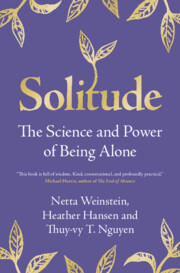Book contents
- Solitude
- Solitude
- Copyright page
- Contents
- Note to the Reader
- Introduction
- Chapter 1 Solitude Is Not Just for Hermits, Poets, and Billionaires
- Chapter 2 Everyday Solitude for Everyday People
- Chapter 3 What Makes Solitude Great?
- Chapter 4 Mapping the Benefits of Solitude
- Chapter 5 What’s Choice Got to Do with It?
- Chapter 6 Balancing Solitude with Social Time
- Chapter 7 Super/Natural Solitude
- Chapter 8 Finding Your Happy Place in Solitude
- Chapter 9 Can We Get Better at Being Alone?
- Chapter 10 Solitude across a Lifetime
- Acknowledgments
- References
- Index
Chapter 5 - What’s Choice Got to Do with It?
Published online by Cambridge University Press: 24 March 2024
- Solitude
- Solitude
- Copyright page
- Contents
- Note to the Reader
- Introduction
- Chapter 1 Solitude Is Not Just for Hermits, Poets, and Billionaires
- Chapter 2 Everyday Solitude for Everyday People
- Chapter 3 What Makes Solitude Great?
- Chapter 4 Mapping the Benefits of Solitude
- Chapter 5 What’s Choice Got to Do with It?
- Chapter 6 Balancing Solitude with Social Time
- Chapter 7 Super/Natural Solitude
- Chapter 8 Finding Your Happy Place in Solitude
- Chapter 9 Can We Get Better at Being Alone?
- Chapter 10 Solitude across a Lifetime
- Acknowledgments
- References
- Index
Summary
In solitude, as with any human experience, choice is an important driver. We know that humans, in general, like having some decision-making capability, or at least the perception of it. Positive time spent in solitude stems from the desire to be with ourselves, and we talk about how to exercise choice to be more comfortable and stronger in solitude. Simply wanting to avoid other people does not unlock its benefits and opportunities. The fact that you choose to devote your morning walk, drive to work, or shower time to solitude is what matters in building an enduring practice of everyday solitude. In this chapter, we also consider involuntary solitude, like prisoners in solitary confinement and pandemic lockdowns. This chapter also looks at what it means to have a "preference for solitude," the importance of understanding motivation in why we’re choosing time alone, and what it means to have the right framing and expectations for solitude.
Keywords
- Type
- Chapter
- Information
- SolitudeThe Science and Power of Being Alone, pp. 87 - 108Publisher: Cambridge University PressPrint publication year: 2024

